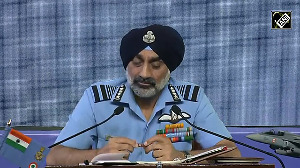Congressman Tom Lantos, the incoming chairman of the House International Relations Committee, applauded the signing of the Indo-US nuclear cooperation bill into law on Monday.
"The signing of this bill is a historic moment for both our great countries," Lantos, who had spearheaded the efforts to ensure the smooth passage of the bill, said.
"This expansion of peaceful nuclear trade will usher in an improved partnership between India and the United States based on our shared objective of preventing the spread of dangerous nuclear technology to countries and groups that will use it for evil purposes," he said.
Lantos and departing International Relations Committee Chairman Henry Hyde, after whom the bill is named, spent more than a year shepherding the measure through the legislative process, resolving the concerns of some who said it would be detrimental to efforts to halt the spread of nuclear weapons.
A bill drafted by the Administration was scrapped in favor of a series of legislative steps that will ensure that India's civil and military nuclear programs remain separate, assert Congress' oversight prerogative as the agreement is implemented, and require reporting to Congress by the White House on India's cooperation with U.S. efforts to deter Iran's nuclear weapons ambitions.
Congressman Joseph Crowley, member of the House International Relations Committee, also attended the White House ceremony.
Joining the Congressmen were fellow lawmakers from Capitol Hill who supported the legislation that would begin the process of clearing the hurdles for the transfer of nuclear technology to India's civilian nuclear reactors, and bring the Asian nation into the tent of nuclear accountability.
They were Senators Bill Frist and George Allen, and Representatives Gary Ackerman, Frank Pallone and Thad McCotter.
"Today is an historic day and a great day that will be remembered as the beginning of a new era in US-Indian relations. With the signing of this crucial legislation, we are one big step closer to positively redirecting the partnership between the United States and India in this century," Congressman Crowley said.
"Congress has provided realistic parameters for this transfer of civilian nuclear technology - a trade agreement that will benefit both nations. Now the responsibility for making this agreement a success is in the hands of President Bush and the Indian government."
Pallone, the founder and former co-chair of the US Congressional Caucus on India and Indian-Americans said: "This is truly an historic day for U.S./India relations, and I congratulate the Indian-American community for its dedication to building support for this landmark law. The most significant comments at today's bill signing came from President Bush when he stated that India is a friend. I believe this deal best demonstrates this strong bond of friendship that exists between our two nations, one that will only grow stronger in the years to come."
He further added: "The US has an important stake in ensuring regional stability in South Asia, even as Pakistan continues to produce and test nuclear weapons without proper safeguards. With the rising power of Communist China in the region and Osama bin Laden continuing to hide in Afghanistan or Pakistan, we need India as our strategic ally.
Senate Foreign Relations Committee Chairman Dick Lugar, who attended the White House bill signing, said: "This legislation will allow the United States to engage in peaceful nuclear cooperation while safeguarding US national security and nonproliferation efforts, as well as Congressional prerogatives. It is an opportunity to build a vital strategic partnership with a nation that shares our democratic values and will exert increasing influence on the world stage."
The US-India Business Council also hailed the legislation.
USIBC officials attended the White House signing ceremony.
Ron Somers, the president of the USIBC, which spearheaded the US industry's advocacy campaign in favor of the deal, said: "It is extremely gratifying that after only 17 months to the day when Prime Minister Manmohan Singh and President George W. Bush committed in a Joint Statement on July 18, 2005 to deepen the U.S-India strategic partnership as embodied in civilian nuclear cooperation, we are now witnessing this change in U.S. law that finally ends three decades of technology denial against India -- and, in so doing, will change the course of history."





